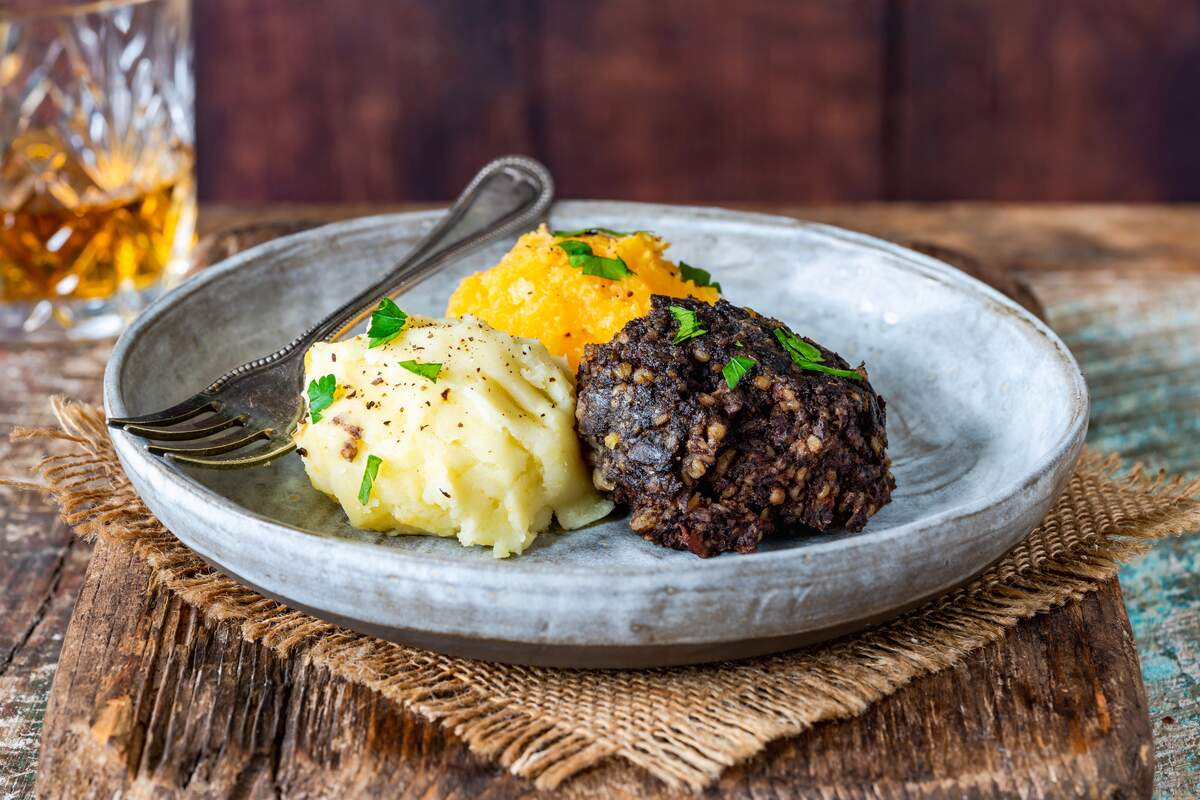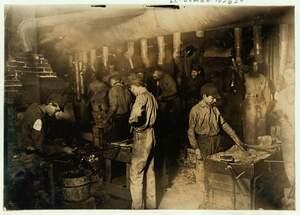

Burns supper
Also known as
Burns Night
Rabbie Burns Day
Robbie Burns Day
Robert Burns Day
Observed
on July 21st (1801)
on January 29th (1802)
annually on January 25th (since 1803)
Dates
Tags
Famous People & Celebrities
Food & Drink
Hashtags
Sources
Burns suppers celebrate the life and writings of Scottish poet Robert Burns. Also known by other names, including Burns Night, Burns suppers are usually held on the anniversary of Burns' birth, but may be on other days. They are celebrated all around the world. The first supper was held on the fifth anniversary of Burns' death, on July 21, 1801. It was organized by his friends and held at Burns Cottage. The longest-lasting Burns Club, started in Greenock in 1801, held their first Burns Supper on January 29, 1802, on the date they thought was Burns' birthday. But when records found in the parish town of Ayr the following year showed his birthday was actually January 25th, the suppers were changed to that date, and have been held on it since.
The Scottish Parliament welcomes the yearly celebration of Robert Burns. They consider him to be one of the world's great poets, believe that his work has influenced thinkers across the world, and acknowledge that his first published collection—Poems, Chiefly in the Scottish Dialect, or the Kilmarnock Edition—helped popularize and champion the Scottish language. They believe "that the celebration of Burns Night is an opportunity to raise awareness of the cultural significance of Scots and its status as one of the indigenous languages of Scotland" and "in the importance of the writing down of the Scots language to ensure its continuation through written documentation, as well as oral tradition."
Burns suppers can be formal or informal, and vary from location to location, but follow a general format and order. Formal Burns suppers are hosted by universities, sporting clubs, Burns Clubs, Freemasons, and St. Andrew's Societies. They begin with a bagpiper greeting the guests, which is known as "piping in guests." The supper's host then gives a welcoming speech, and guests are seated for the saying of grace, which usually is Selkirk Grace, a prayer that uses the Scots language.
Supper begins with a soup course, which usually is a Scottish soup like potato soup, Scotch broth, Cullen skink, or cock-a-leekie. The main course is haggis, a traditional Scottish meat dish. Vegetarian haggis has become an option in recent years. Everyone stands as the haggis is brought in, usually by the cook, on a large dish. The bagpiper plays and the haggis is brought to the host's table and set down. Address to a Haggis, written by Burns, is then recited. During the poem, a knife is usually sharpened and used to cut the haggis. At the poem's end, a Scotch whisky toast is given for the haggis, and the guests are seated. The haggis is usually served with mashed potatoes (tatties) and mashed swede turnip (neeps).
Coffee, cheese courses, and dessert courses are sometimes part of the supper. Cranachan and tipsy laird (whisky trifle) are two Scottish desserts that may be made for it. During coffee, speeches and toasts are commonplace. The main speaker gives a speech remembering part of Burns' life or poetry, which may include a recitation of one of Burns' songs or poems. This is followed by an "Immortal Memory" toast to Burns. There also is an Address to the Lassies, when a male speaker shares their views on women. The speech is meant to be amusing, not offensive, and is followed by a toast to the health of women. This is followed by the Reply to the Laddies when a female speaker shares their views on men and addresses anything specific said in the Address to the Lassies. Like the previous speech, it is meant to be amusing, not offensive.
Following the speeches, Burns' songs may be sung and his poetry may be read. Works by poets influenced by Burns may be included, especially those written by Scots. At the closing, the host calls up a guest to give the vote of thanks. Everyone then stands and joins hands to sing "Auld Lang Syne" to end the supper. Burns suppers sometimes end with dancing or a ceilidh.
Robert Burns was born into a poor farming family in Alloway, in Ayrshire County, Scotland, on January 25, 1759. His parents were tenant farmers, and he grew up toiling in the family business. Despite living on a farm, the family didn't have much to eat; they couldn't afford meat and often subsisted on oatmeal and skimmed milk. But Burns' parents made sure he and his siblings were educated; Burns had a private tutor, and he was also tutored by his father. Burns was drawn to books and read Shakespeare, David Hume, Adam Smith, and much more by the time he was a young man.
Burns was writing love poems by the age of 15, but it wasn't until his father died in 1784 that he began taking writing more seriously. His first poetry collection, Poems, Chiefly in the Scottish Dialect, was published in 1786. It is also known as the Kilmarnock Edition because it was printed in Kilmarnock. It includes works like "The Twa Dogs," "Address to the Deil," "Halloween," "The Cotter's Saturday Night," "To a Mouse," and "To a Mountain Daisy." Poems, Chiefly in the Scottish Dialect gave Burns regional notoriety.
Twins were welcomed by Burns and Jean Armour that same year. The couple married and had nine children together. Burns had twelve children in total. In November, Burns went to Edinburgh, the cultural capital of Scotland, and was received to wide acclaim. The following year, three of his songs were published in the first volume of James Johnston's Scottish folk song collection Scots Musical Museum. Over the years, close to 200 of Burns' songs were published in other volumes of the collection.
Financial struggle was a constant for Burns, who spent most of his life close to poverty. He took a public service job in 1788 when the small farm he leased and his poetry failed to provide him with enough income. In 1791, he fully abandoned farming to work full-time in Dumfries as a tax collector. He continued to write poems throughout it all. In November 1790 he finished "Tam o'Shanter," considered by some to be his masterpiece. Some of his other best-known poems or songs are "Auld Lang Syne," "Ae Fond Kiss," "A Red, Red Rose," "Scots Wha Hae," and "A Man's a Man for A.'"
Burns wrote poems and songs of universal appeal. He was able to sympathize with the plight of others, and his work examined the aspirations and anguishes of humanity and called for the brotherhood of man. He wrote about the human condition and spirit, love, lust, nature, life, and death. He explored themes of injustice, hypocrisy, gender roles, sexuality, radicalism, the harshness of life of his countrymen, anticlericalism, man's humanity to fellow man, and Scottish cultural identity. He wrote everything from satires to love songs, and his work spoke to all with a sympathetic voice.
Besides being a writer, Burns founded a debating society called the Tarbolton Bachelors' Club, became a Freemason, was a critic of the church, took the side of the poor and was enraged by inequality, and supported the American Revolution and the French Revolution at its outset. He was known for his drinking and womanizing, which often overshadowed his work. He died from rheumatic fever—a disease that now is treatable—on July 21, 1796. He was just 37. He was not fully appreciated until after his death, but his poems and songs have since become revered around the world. The life and writings of Robert Burns continue to be celebrated each year with Burns suppers, which are held today.
How to Observe Burns supper
Take part in the day in some of the following ways:
- Attend or hold your own Burns supper.
- Prepare and eat food traditionally eaten at a Burns supper such as haggis, Scotch broth, Cullen skink, cock-a-leekie, cranachan, and tipsy laird.
- Drink some Scotch whisky.
- Read some poetry by Robert Burns, online or in print form.
- Read a biography about Robert Burns.
- Take a quiz about Robert Burns.
- Listen to the Tae The Bard podcast.
- Join a Burns Club.
- Visit the Robert Burns Birthplace Museum, home to Burns Cottage, where the first Burns supper was held and where Burns was born.
- Stop at a Robert Burns memorial.
- Watch Robert Burns: The People's Poet.





















